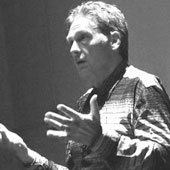
Photograph: Hans Sylvester
Interni and the Be Open Foundation are publishing a book, called Gallery Of The Senses, that explores the ways we experience the contemporary world through sight, hearing, smell, taste and touch. It then asks: Are we missing a sixth sense? Here is my contribution.
Humanity’s troubles did not begin with the industrial age, nor even with agriculture. Our problems began when we embraced symbolic culture and placed language, art, and number above other ways of knowing the world.
Symbolic culture, abstract reasoning, and philosophy, gained in social standing as civilisation grew — and for understandable reasons: It was comforting to be shielded from the immanence of death among living systems. Monophasic forms of perception separated us cognitively from a world filled with wild animals and uncertainty. Philosophy, to its practitioners, felt remote and godlike. It was a pleasing place to be.
Science, the worldly child of philosophy, has delivered tremendous material and economic success in more recent times. A global civilisation has been built on the capacity of science and capital to transform physical resources into power and wealth. But it’s a system that feasts on external nutrient supplies that remain out of sight, and out of mind. Living in a ‘desert of the real’, we’re distracted by media — and by abstract thinking — from the growing disconnect between humans and the biosphere. Awash in information, but starved of meaning, we allow the metabolic interaction between man and the earth to wither.
As we rediscover a sense of ecological responsibility for the present, and towards future generations, our cultural priorities are changing. There’s a palpable reawakening of attentiveness and and empathy with living systems — a search for shared understanding of how they work, how and why they change through time.
Thanks to science, we have much to build on: Our world is filled with representations of invisible phenomena — from quarks, to immune systems. But that’s just a start. There’s renewed respect for cultures whose aesthetic relations to the biosphere are enriched by perceptual diversity. Many of our fellow human beings, we now realise, experience the world in ways that we have forgotten. These perceptual processes include altered states of consciousness in which meditation, trance, dreams, and imagination transform unfiltered input from the senses. For them — and soon, again, for us, perceptual diversity are literally second nature.
On 3 October, I will develop these themes in Perth, Australia, at a conference on The Aesthetics of Sustainability. For background reading, see our handout Regarding The Pain Of The Planet: A Reader


Comments [1]
09.14.13
01:01